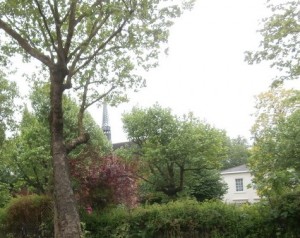I apologise in advance that this isn’t really about music, although there is a slight musical angle to it.
On my way to a Lord’s Test match last year I walked along the Regent’s Canal and noticed a handsome church on the other side in Maida Avenue. Later I looked it up and found it is the place where the last regular meetings of the Catholic Apostolic Church are believed to take place. This denomination once had a presence in most English towns of any size (Bath’s church is now the children’s nursery in Guinea Lane) and still has considerable assets, including owning Christ the King in Gordon Square. (The evidence for this can be found in the accounts filed with the Charity Commission.) But its belief in the imminent Second Coming was the source of its near-total demise. According to its rules, priests can no longer be validly ordained, and the last one died nearly 50 years ago.
It was apparently renowned for its music, with its own hymnbook and other liturgical music. Much of this was composed by Edmund Hart Turpin, and how good you thought the music was probably depended on what you thought of him as a composer. A similar situation applied with regard to Edward Wilton Ellis and hymn texts. At this point you realise how lucky the Methodist Church was to have Charles Wesley as its founding hymnographer. But there seems to have been no second generation of Catholic Apostolic Church composers, probably because of the long decline of the denomination through the first part of the 20th century.
So why is there still a congregation? I can think of other denominations at the ‘high’ end of the spectrum which are clinging on with a handful of adherents. The ordination of women has created a number of splinter groups breaking off from the Church of England, which (rather in the manner of Marxist political parties in Britain) have further subdivided themselves into ever smaller factions. There is at least one similar group which has seceded from the Roman Catholic Church over Vatican II. They have few church buildings, although I know of a church in Reading and recall seeing another (which was a former shop) in Canterbury; St Ninians, Whitby has successively belonged to three of these small groups since leaving the Church of England.
Why would anyone choose to be in such a denomination? Especially if you regard its sacraments alone as valid? Why attend a church such as the one in Maida Ave which seems to reject any form of evangelism, even a notice board? I can think of a few reasons:
- conviction that you alone are right and the rest of Christendom, in particular the major denominations, are in error
- an attachment to a particular building, congregation or liturgy
- a chance to have a leading role with an impressive-sounding title
- satisfaction at feeling that you are one of a very exclusive group


More cynically, according to those accounts, the Catholic Apostolic Church still has a ‘poor fund’, for the relief of members of the church in financial distress, which distributes a five-figure total each year! Probably attracts a few of the congregation!